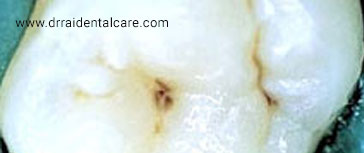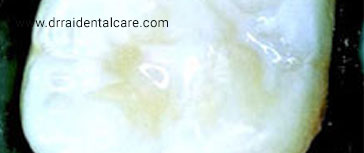

"It is our endeavour to offer highest quality crowns and bridges in esthetic zone.We offer Cercon,Procera and Empress all ceramic laminates , crowns,bridges which have distinct advantage over ceramic fused to metal which over the years expose a greying black margin due to tissue shrinkage making the smile higly unpleasant. So smile confidently as the years pass by without your restorations showing any sign of ageing."
The chewing surfaces of the back teeth (molars and premolars) are usually made up of deep pits and grooves or fissures. Although brushing and flossing helps remove food particles and plaque from smooth surfaces of teeth, pits and fissures are extremely difficult to clean. Toothbrush bristles cannot reach all the way into the depressions and grooves and the normal flow of saliva, which helps clean food particles from other areas of the mouth, cannot "wash out" pits and fissures. This makes them specially prone to decay. In fact, most cavities form in pit and fissure areas. The permanent molars are extremely susceptible to this form of decay.
Sealants protect these vulnerable areas by "sealing out" plaque and food. They create a smooth surface which prevents the food material from getting into these crevices and facilitates easy cleaning. This decreases the risk of caries.
The entire process of sealing the teeth is very simple and is done in one visit. The teeth are first cleaned of all debris. The surfaces to be sealed are etched to permit the bonding of the sealant to the tooth. The sealant material is then painted into the pits and fissures and allowed to harden.
They should be done when the permanent first molars come in, usually at about the age of six.
Longevity of sealants greatly depends upon eating habits. Sealants hold up well under the force of normal chewing and usually last several years before a reapplication is needed. Chewing ice, hard popcorn kernels and "sticky" candies often results in less retention time of sealants. As long as the sealant remains intact, the tooth surface will be protected from decay. During your regular dental visits, your dentist will check the condition of the sealants and reapply them when necessary.
Sealants are easy for your dentist to apply and it takes only a few minutes to seal each tooth. There is no pain and no drilling involved in this treatment.
Sealants can also stop very small areas of early decay from becoming larger. Reliable clinical studies have confirmed that properly placed sealants, if kept intact, will stop decay in the enamel.
Prevention is better than treatment. Properly applied and maintained sealants are extremely effective in preventing pit and fissure decay and hence decrease the need for treatment. This makes sealants very cost-effective, saving you both money and discomfort.
The likelihood of developing pit and fissure decay begins early in life, so children and teenagers are obvious candidates, but adults can benefit from sealants as well.
The best way to determine the need for sealants is to evaluate the person's risk for pit and fissure decay which continues throughout adulthood. Not only does this vary from person to person, but also varies for the same person over time because changes in personal habits, health status and medication are known to increase the risk of decay. Lack of access to fluorides and fluoridated water, a history of previous decay, and chronic xerostomia (dry mouth) are also factors your dentist will consider when evaluating you for sealants.